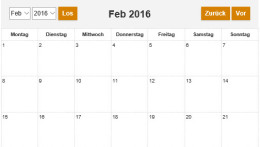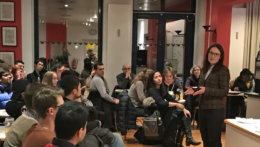Regional Group Munich
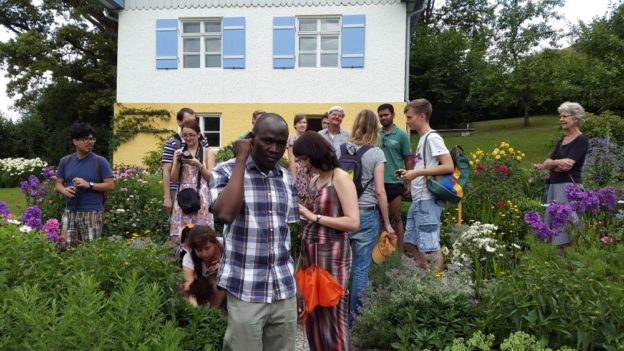
Cosmopolitan and ‘gemütlich’
Oktoberfest, Deutsches Museum, FC Bayern, BMW, beer, museums and top-class orchestras. This is what Munich is famous for the world over. We invite you to discover this and much more with us. Enjoy Bavarian culture and the Bavarian way of life with us!
You can experience our ‘village of a million people’ and the surrounding area at numerous events each year with scholarship holders from all over the world, from all possible disciplines and from all universities and research institutions in the Greater Munich area. We also visit cities and towns near and far, sometimes together with other regional groups.

It is so easy to find new friends with the DAAD as common ground. My recommendation is to make use of what DAAD Alumni & Friends has to offer!
Matteo Parisi (Italy)
In autumn, we prepare newcomers for their stay at a big welcome meeting. Our informal monthly gatherings during the semester offer DAAD scholars a perfect opportunity to deepen contacts. We focus on topics from history, industry, technology and science with expert guides, and we look forward to a broad cultural programme. We have great fun hiking, bathing, sledding or canoeing in the Alps and in various beautiful areas in Bavaria.
Our specialist events organized in collaboration with the Tönissteiner Kreis or with DAAD alumni offer particularly fruitful opportunities for exchange. And if you would like to find out more about everyday life in Germany, we will do our best to arrange an invitation to spend time with a family, most often a whole weekend.
Team

Sibylle Wahl:
‘There is much more to a good time in Munich than just academic success. I greatly enjoy helping scholarship holders to find their way around our beautiful city and feel comfortable.’

Felix Hansen:
‘In 2008 I had the opportunity to go to Melbourne for six months with the DAAD. Back in Germany, I am now pleased to have the big wide world here in Munich, to meet you at our informal gatherings and to go on excursions and city trips with you.’
 Annette Schörner
Annette Schörner
‘For a successful study or research stay, it is also important to have social contacts, networking opportunities and physical fitness. There is a lot to discover outside the institutes! And after a day out, it’s back to work with renewed concentration.’
Contact
If you have any questions or suggestions, if you would like to be added to our mailing list and/or if you are interested in joining the team, please write an e-mail to fk-muenchendaad-alumni.de
Events
Find here an overview of all upcoming events.
In addition the following events are in the pipeline, a.o.:
- Oktoberfest visit
- Guided tour Concentration Camp Memorial Dachau
- Guided tour Allianz-Arena
- City trip Salzburg
- Hike to Andechs monastery
- Guided tour Bavaria Monument and Ruhmeshalle/Hall of Fame
- City trip Regensburg
- Hike Maisinger Schlucht/Maisinger See
- Hike Wallgau/Krepelschrofen
- Hike Schliersbergalm
- Guided tour Residenz / City residence of the Bavarian Kings
- Hike Bayerischzell – Seebergkopf
- Castle Schleißheim
- Hike Mittenwald – Kranzberg
- Trip to Ammersee and boat tour
- Trip to Bamberg und Bayreuth
- City trip Landsberg
- Iceskating
- City trip Augsburg
- City trip Ulm
- Visit to Landshuter Hochzeit festival
- Trip to Burghausen
Links
These links provide more information about international affairs at the two main universities in Munich, and about a wide array of Munich city affairs:
Accommodation hunt
If you are not among the lucky ones whose package comprises a room at a public student dorm or who happen to know somebody (e.g. from your university programme, or your city – we recommend highly that you try to find help this way) from whom you can take over their place to stay, you are probably in for a chore.
Housing in the Munich area is very scarce and expensive, and you will be competing with lots of Germans who are in the same situation, but better off for reasons of language and location. Hence apartment or WG (shared housing) hunting is a considerable challenge, even more so if you aren’t already here when you start looking and if you don’t speak German. It can amount to a full-time ‘job’ for anyone starting their studies or research in Munich.
Bear in mind that at the time when most DAADians arrive in Munich, which is in the fall, lots of tourists are in the city for the Oktoberfest and it may be difficult to find even short-term accommodation. So ideally you know somebody who will let you stay with them at least as a start.
Average price for a WG room is about 700 euros (!). For potential additional financial support from DAAD for housing, ask your DAAD contact. It is possible to find something cheaper, but not very likely, unless it’s a student dorm. Unfortunately a low price is suspicious. And don’t count on finding a place near your university. Again, it’s not impossible but not very likely. Anywhere near public transport, bus/tram, U-Bahn or S-Bahn (S-Bahn runs less often and is somewhat less reliable) is fine. Munich is also a fairly good city for bike-riding.
Here are some hopefully useful hints, based on information collected by DAADian Kasia. We sympathize with anyone facing the task of house-hunting, but as we are a small team of volunteers who cater for several hundred DAADians in Munich (in addition to our other commitments), we do not have the resources or authority to provide individual help with housing beyond the information provided here.
We’re afraid that very probably you can’t count on the International Offices for help, they are understaffed for this challenge.
If you are a post-doc or researcher, your chance for getting help is a little better. Check the relevant information on the TUM international center, LMU international office and Studentenwerk sites.
PLACES TO START LOOKING: See links below. This is not a complete list. There are new websites cropping up all the time. Just google any combination of relevant words. For general info, the TUM site is useful for anybody, no matter if you are a TUM student or not.
The Studentenwerk provides you with links to various categories of housing including private and public student dormitories (Studentenwohnheime), and WGs. Public dorms are the cheapest housing option, but scarce, and very much in demand among students. There are strict deadlines for application, but there is also a chance to get in via lottery. It is hard, even for German students, to get into a dorm, there are just too few places compared with the number of students. Normally there are waiting times for publicly funded ones. However, it is not impossible to get a place, provided you are eligible, and the earlier you start applying the better! Mind that there are also students living in Wohnheime who leave for short periods (Erasmus, internships) and offer sublets. These offers, however, are not normally administrated by the Wohnheime, instead they appear on websites like WG-Gesucht.
The Studentenwerk offers a special accommodation service for overseas students. Bear in mind that they are understaffed and may respond slowly to your request.
In the case of private dorms, you have to apply to each individually.
www.wg-gesucht.de is the most popular website in Germany for people looking for flatmates, mostly used by young people and students. That’s where pretty much everyone who has a room in a WG (shared apartment) to offer advertises. WGs are the most common housing choice among students. Average price per WG room in Munich is now 700 euros. However, you can also find single-room or multiple-room apartments here. You may be very lucky and find a place near your university, but don’t count on that. You should not restrict your search too much regionally. Bear in mind that S-Bahn is a much less reliable means of transportation than U-Bahn, especially in the winter.
WG-Gesucht is also THE PLACE if you are looking for a ‘Zwischenmiete’ (temporary sublet). This is the best option for you if you are going to stay in Munich for a short period (say, less than six months) or if you want an interim place from which to start searching for a long-term rental. Most landlords prefer tenants who stay for longer periods, so sublets can be your chance.
Very important: Do not make advance payments on deposit or rent! There are lots of fraudsters about who take advantage of the plight of accommodation seekers. I have heard about a case where fraudulent offer was listed on a legitimate site like Studentenwerk. If you do fall victim to a crook, LMU and Studentenwerk provide legal advice.
How to be invited to an interview for a WG room and to – hopefully – pass
- Don’t stop checking for new offers, but keep on contacting people! You might feel that you’ve done everything you can – but this is not true, you can – and may have to – still do much more.
- Your chances increase if you call the contact person directly – of course only if he/she provided his/her phone number, and few people do so as they can be expect to be swamped with calls. Around 90% of emails are usually not read due to the enormous number of incoming messages.
- Your chances will increase even more if you know some German and are not too lazy/scared to use it.
- In case your German does not yet allow you to explain what you need, you still have a chance! If the person you called does not speak English, contact her/him by email following your call.
- If you are responding to an offer via email, try to avoid clichés. The person you address should find the way you present yourself interesting. Attach a good picture, describe your hobbies – but be sure to match the interests of your potential room-/flatmates. If they say they would like to have a ‘trinkfest’ buddy, this means that you should be prepared for long parties, with alcohol flowing freely. If you hate pets it’s probably a good idea to skip an ad from a lady keeping a dog in her WG.
- If you’re browsing the wg-gesucht site, always check the newest offers and contact them IMMEDIATELY! If you are one of the first to call/write, you will have a significant advantage.
- If you are finally invited to an interview – congrats, it is already an achievement. Try to match your look to what you know about your flatmates. Look well-groomed, but don’t put on your best gear – your potential WG-inhabitants are most likely students and/or casual guys, so a posh look might turn them off.
- Again, if you speak some German, try to speak it at the interview.
- Be honest and friendly, but don’t ingratiate yourself.
- Sometimes it helps to mention that you’ve been looking for a flat for X months without any result and/or you are about to be kicked out from your current abode. Even Germans have a soft spot.
- Try to tell them an interesting story about yourself, about your hobbies, current studies and experience in Germany. Show an interest in their interests, an interesting cross-cultural conversation may develop.
- Always tell them for how long you are planning to stay.
- ‘Open interviews’ are mass events where every applicant is invited to an interview during a certain time span, e.g. from 1 to 3 pm. Don’t be scared of the number of people there (when you arrive there may already be 20 – 40 homeless students). It is extremely difficult to make an impression on the hosts in such a situation. They will talk to you for a minute or so. If you feel creative and the chemistry is right – go for it. In general it is really, really hard to be selected under such conditions.
Good luck!
For your accommodation hunt the following links can be useful. Don’t be mad if one of the links doesn’t work, they keep changing:
https://www.tum.de/en/university-life/accommodations/
http://www.studentenwerk-muenchen.de/en/student-accommodation/
https://www.xn--isas-mnchen-yhb.de/wohnen/ includes a long list of further links
Banking and Phone Information
Information provided by DAAD scholar Mykola – without guarantee!
For mobile carriers:
https://prepaid-data-sim-card.fandom.com/wiki/Germany
For home internet and telephony:
https://checkalle.de/dsl-compare
For banking: most students choose N26 if it’s available for them, no bad feedback so far
Here’s a comparison of more popular brands
https://thebanks.eu/compare-banking-products/current-accounts/Germany
https://expatwiki.org/Germany/Banking/Students
Here’s a list of all available banks https://en.wikipedia.org/wiki/List_of_banks_in_Germany
Additional information
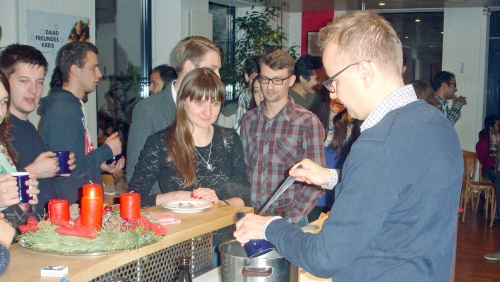
Informal gathering
During the semester, we normally meet every second Tuesday of the month at 7 pm in the LMU-KHG cafeteria. Friends are very welcome.
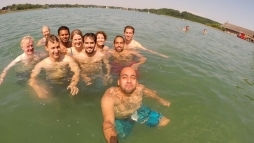
We are looking for Support!
Are you interested in international exchange? There are many opportunities to participate. Write to us, and find out more!

